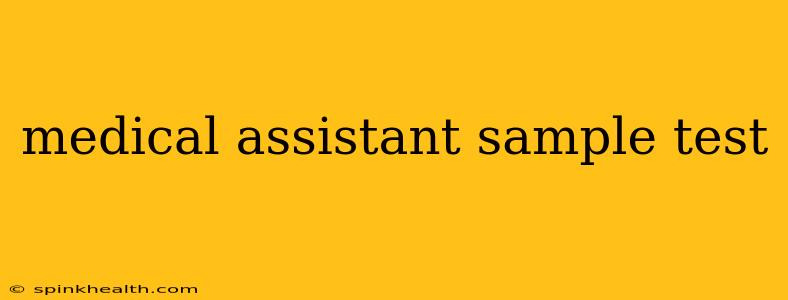Acing the Medical Assistant Sample Test: A Journey Through the Exam
So, you're preparing for your medical assistant (MA) certification exam? The thought alone can be a little daunting, like facing a mountain range. But fear not, aspiring MA! This isn't about conquering a mountain; it's about climbing it, one step at a time, with the right gear and a clear path. Think of this blog post as your trusty map and compass. We'll explore the typical content of a medical assistant sample test, equipping you with the knowledge and confidence to succeed.
Let's start our journey by understanding the terrain. Medical assistant sample tests are designed to mirror the real thing, covering a broad range of skills and knowledge essential for a successful career. Expect questions across several key areas, including administrative, clinical, and ethical aspects of the job.
What are the Key Areas Covered in a Medical Assistant Sample Test?
Medical assistant sample tests typically cover these crucial areas:
1. Administrative Duties: This section will assess your understanding of vital administrative tasks. Think about the everyday operations of a medical office—how smoothly they run depends on a competent MA.
-
Scheduling and Appointment Management: You'll encounter questions on scheduling patient appointments, managing patient records, and handling cancellations and rescheduling. Picture this: a flurry of calls, patients needing to be rescheduled, and you, the calm eye of the storm, skillfully managing it all.
-
Medical Records Management: This includes understanding HIPAA regulations (crucial!), proper filing systems, and maintaining accurate patient records. Think of it as being the guardian of sensitive information – accuracy and confidentiality are paramount.
-
Insurance and Billing: You'll face questions on medical billing procedures, insurance claims processing, and understanding different types of insurance plans. Navigating the complexities of insurance is a key part of the job, requiring a thorough understanding of codes and procedures.
-
Communication and Customer Service: Excellent communication is vital. You'll be tested on your ability to effectively communicate with patients, doctors, and other staff members. Think calm, clear, and professional communication – it's the cornerstone of patient care.
2. Clinical Duties: This is where your practical skills come into play. This section will evaluate your knowledge of clinical procedures and patient care.
-
Vital Signs Measurement: Accuracy is key here! You'll need to know how to accurately measure blood pressure, temperature, pulse, and respiration rate. Think of this as the first step in diagnosing a patient's condition; your accuracy is paramount.
-
Phlebotomy: This involves drawing blood samples, a critical procedure requiring precision and a steady hand. It’s a skill that requires both technical expertise and a reassuring demeanor to calm nervous patients.
-
Electrocardiography (ECG): Understanding how to perform and interpret ECGs is essential. Think of this as reading the heart’s electrical activity—a skill vital for detecting abnormalities.
-
Sterilization and Infection Control: Maintaining a sterile environment is critical to prevent infections. You’ll be tested on your knowledge of sterilization techniques and infection control protocols. Think meticulousness and precision—the health of patients relies on this.
-
Assisting the Physician: This includes preparing patients for examinations, assisting with minor procedures, and ensuring the smooth running of the clinical environment. You’ll be the physician's right hand, a vital part of their success.
3. Medical Terminology and Anatomy: A strong understanding of medical terminology and basic anatomy is crucial.
-
Medical Terminology: You’ll need to understand common medical terms, abbreviations, and prefixes/suffixes. This is the language of medicine, and fluency is key.
-
Basic Anatomy and Physiology: A basic understanding of the human body's structure and function is essential for performing many clinical tasks. This forms the base of your clinical knowledge.
4. Medical Ethics and Legal Considerations: Ethical and legal issues are vital aspects of healthcare. You’ll encounter questions on:
-
HIPAA Compliance: Protecting patient privacy is paramount. Understanding and adhering to HIPAA regulations is non-negotiable.
-
Patient Confidentiality: Maintaining patient privacy is a cornerstone of trust.
-
Professional Conduct: Ethical behavior is essential for maintaining patient trust and upholding the integrity of the medical profession.
How to Prepare for Your Medical Assistant Sample Test:
-
Practice, Practice, Practice: Utilize various sample tests to familiarize yourself with the question format and content.
-
Review Key Concepts: Thoroughly review your textbooks and class notes, focusing on the areas mentioned above.
-
Utilize Online Resources: Many websites and resources offer practice tests and study materials.
-
Seek Feedback: If possible, ask for feedback on your practice tests to identify areas needing improvement.
Remember, success is a journey, not a destination. By dedicating time to preparation, focusing on your strengths, and addressing your weaknesses, you'll be well-equipped to conquer your medical assistant sample test and embark on a fulfilling career in healthcare. Good luck!

